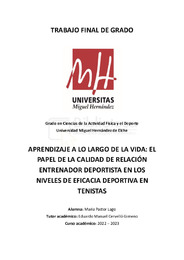Please use this identifier to cite or link to this item:
https://hdl.handle.net/11000/29438Full metadata record
| DC Field | Value | Language |
|---|---|---|
| dc.contributor.advisor | Cervelló Gimeno, Eduardo Manuel | - |
| dc.contributor.author | Pastor Lago, María | - |
| dc.contributor.other | Departamentos de la UMH::Ciencias del Deporte | es_ES |
| dc.date.accessioned | 2023-09-11T07:52:53Z | - |
| dc.date.available | 2023-09-11T07:52:53Z | - |
| dc.date.created | 2023-06 | - |
| dc.identifier.uri | https://hdl.handle.net/11000/29438 | - |
| dc.description.abstract | La relación entre el entrenador y el deportista es una de las variables más importantes que influyen en el rendimiento deportivo. El objetivo de este estudio es comprobar como a través de un proceso de intervención con los entrenadores, una buena relación entrenador-deportista, puede hacer que haya una menor ansiedad precompetitiva, un menor criticismo y un mayor rendimiento y autoconfianza. Para llevar a cabo este proceso, se ha hecho un estudio con dos clubes, uno de ellos era el grupo experimental y otro era el grupo control. A ambos clubes se les ha hecho un análisis pre y un post, en el que los jugadores rellenaban unos cuestionarios sobre la relación entrenador-deportista, el criticismo, la ansiedad y el rendimiento. La diferencia que había entre ambos grupos a lo largo del proceso era que, en el grupo experimental, los entrenadores recibían unas sesiones de formación, y en el grupo control no. Los resultados muestran como una relación en la que haya cercanía, complementariedad y compromiso, hará que el jugador tenga una mayor autoconfianza y un mayor rendimiento y, además, una menor ansiedad cognitiva y un menor criticismo. | es_ES |
| dc.description.abstract | The coach-athlete relationship is one of the most important variables that influence sports performance. The aim of this study is to verify how trhough a process of intervention with coaches, a good coach-athlete relationship can lead to less pre-competitive anxiety, less criticism and greater performance and self-confidence. To carry out this process, a study was carried out with two clubs, one of them was the experimental group and the other was the control group. Both clubs underwent a pre and post analysis, in which the players filled out questionnaires about the coach-athlete relationship, criticism, anxiety and performance. The difference between the two groups throughout the process was that, in the experimental group, the coaches received training sessions, whereas in the control group they did not. The results show how a relationship in which there is closeness, complementariety and commitment will lead the player to have greater self-confidence and higher performance and, in addition, less cognitive anxiety and less criticism. | es_ES |
| dc.format | application/pdf | es_ES |
| dc.format.extent | 18 | es_ES |
| dc.language.iso | spa | es_ES |
| dc.publisher | Universidad Miguel Hernández de Elche | es_ES |
| dc.rights | info:eu-repo/semantics/openAccess | es_ES |
| dc.rights.uri | http://creativecommons.org/licenses/by-nc-nd/4.0/ | * |
| dc.subject | relación entrenador-atleta | es_ES |
| dc.subject | criticismo | es_ES |
| dc.subject | rendimiento | es_ES |
| dc.subject | tenis | es_ES |
| dc.subject.other | CDU::7 - Bellas artes::79 - Diversiones. Espectáculos. Cine. Teatro. Danza. Juegos.Deportes | es_ES |
| dc.title | Aprendizaje a lo largo de la vida: El papel de la calidad de relación entrenador deportista en los niveles de eficacia deportiva en tenistas | es_ES |
| dc.type | info:eu-repo/semantics/bachelorThesis | es_ES |

View/Open:
TFG-Pastor Lago, María.pdf
741,61 kB
Adobe PDF
Share:
.png)
